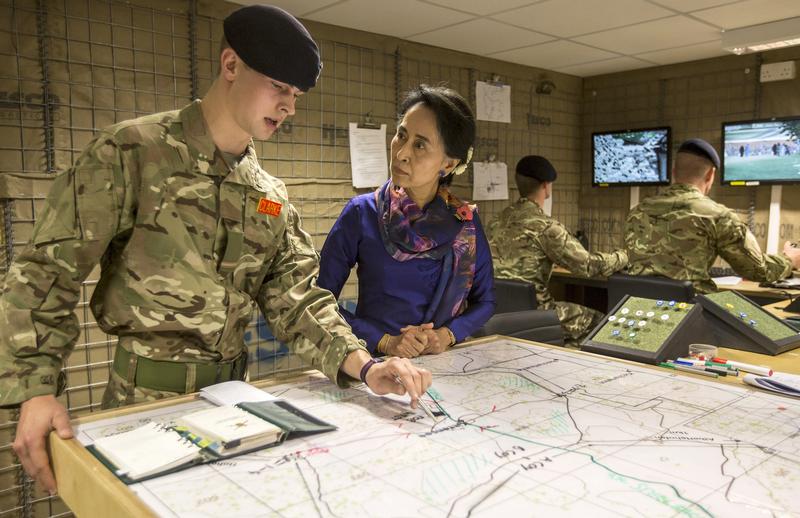The Tatmadaw lashed out at the British government on Wednesday after the latter suspended existing military-to-military engagement in the wake of a counter-insurgency campaign by security forces in Arakan State that the UN has described as “ethnic cleansing” of Rohingya Muslims there.
Though the UK government this week characterised the rupture in so-called “mil-to-mil” relations as a mere suspension until the situation in western Burma returns to some semblance of normalcy, the Tatmadaw said it would “never again send trainees to Britain,” according to a front-page headline in Thursday’s state-run Global New Light of Myanmar.
British Prime Minister Theresa May announced the suspension on Tuesday in New York, where world leaders have gathered for the annual UN General Assembly meeting.
Caught up in the diplomatic crossfire, according to the Tatmadaw, are five Burmese military officers who had arrived in London for a training programme on Wednesday but were to be sent home as a result of the UK government’s decision.
All future arrangements with regard to training programmes administered by the British Ministry of Defence to Burmese military officers would be scrapped, according to the Tatmadaw True News Information Team.
For the bilateral relationship between the two countries, the latest developments are as much symbolic as substantive. Burma’s de facto civilian leader, Aung San Suu Kyi, has long-standing ties to the United Kingdom, including having married a Briton and attended university at Oxford in the 1960s.
In 2013, while still the leader of the political opposition, she visited the British Royal Military Academy at Sandhurst, where she addressed cadets.
“Actually I’ve come here to learn, rather than to teach, because I want to learn what it takes to build a good, professional army that is respected and loved by the people. This is the kind of army we want our Burmese Tatmadaw to be. The kind of army it was meant to be when my father founded it back in the 1940s — of course, to get rid of the British,” she said, to laughs at the time.
In terms of substance, Britain has slow-walked its mil-to-mil engagement with Burma since the Southeast Asian nation’s reform process began in earnest in 2011.
To date, trainings have only included classroom teachings “to promote an awareness of the role and responsibilities of the military within a democratic system,” according to a UK Defence Ministry official, who was responding to a question from a British parliamentarian early this year. It has not included combat training and came at a price tag for British taxpayers of about £305,000 ($410,000) in 2016.
For all her ties to Britain, Suu Kyi arguably has little influence over the fraying of the bilateral relationship made public this week. Constitutionally, she has no authority over her country’s security apparatus, making the alleged conduct of soldiers in Arakan State a matter for which the proverbial buck — or in this case, British pound sterling — stops at Senior-General Min Aung Hlaing, Burma’s commander-in-chief.
He is on a visit to Arakan State this week for the first time since the 25 August attacks by militants from the Arakan Rohingya Salvation Army triggered the military’s heavy-handed counteroffensive. More than 400,000 Rohingya have fled across the border to neighbouring Bangladesh, according to the UN.
Speaking to military personnel and their families in Taungbaza village on Wednesday, Min Aung Hlaing took the opportunity to dig into Burma’s past, pointing a finger of blame at its former colonial oppressor for the present-day crisis in Arakan State.
Citing the historical migration to Burma of labourers from the Indian subcontinent — also a colonial British holding at the time — he said Burma is “facing the consequences of their [Britain’s] reckless acts till now,” according to a post relaying the speech on the commander-in-chief’s Facebook page.
Further fallout?
Critics of the Burmese military may now set their sights elsewhere in Europe, and beyond.
“This is the first practical sanction against Min Aung Hlaing, the head of the military who has ordered this ethnic cleansing campaign,” Mark Farmaner, director of the advocacy group Burma Campaign UK, said in a statement on Tuesday.
[related]
“Now the British government must go further, working for a global UN mandated arms embargo. The European Union should impose a ban on European companies supplying any kind of equipment to the military, not just arms, and also ban investment and business relationships with military-owned companies.”
In April of this year, Min Aung Hlaing visited Germany and Austria, two countries Farmaner said his group would now be targeting with a pressure campaign. Both have reportedly extended offers for training programmes of their own to the Tatmadaw.



